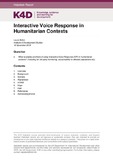| dc.contributor.author | Bolton, Laura | |
| dc.coverage.spatial | Somalia | en |
| dc.coverage.spatial | Afghanistan | en |
| dc.coverage.spatial | Niger | en |
| dc.coverage.spatial | Haiti | en |
| dc.date.accessioned | 2019-01-11T10:44:30Z | |
| dc.date.available | 2019-01-11T10:44:30Z | |
| dc.date.issued | 2018-11-16 | |
| dc.identifier.citation | Bolton, L. (2018). Interactive Voice Response in humanitarian contexts. K4D Helpdesk Report 487. Brighton, UK: Institute of Development Studies | en |
| dc.identifier.uri | https://opendocs.ids.ac.uk/opendocs/handle/20.500.12413/14264 | |
| dc.description.abstract | Interactive voice response (IVR) uses recorded messages to provide a menu of options for callers to access information and provide survey feedback. The potential advantages of IVR in humanitarian contexts include: improved reach to less literate populations, anonymity, data collection and analysis efficiency gains, and rapid response. However, users who are less familiar with technology may be excluded and there is potential for data collection inaccuracies. It is recommended that face-to-face surveys are used with IVR as a supplement (WFP, 2016; Bonino et al., 2014). When used to provide information, time must be taken for careful scripting of messages. Experience with IVR in humanitarian contexts was found in Somalia, Afghanistan, Niger, Rwanda, DRC and Haiti. Reports were often anecdotal and formal evaluations were not identified within the scope of this report. This review found the World Food Programme’s (WFP's) mobile Vulnerability Analysis and Mapping project the most widely cited experience in this area. Their experience suggests that IVR is better for sharing than collecting information. It is also recommended that users are contacted in person to test and prepare them for the IVR process. | en |
| dc.language.iso | en | en |
| dc.publisher | IDS | en |
| dc.relation.ispartofseries | K4D Helpdesk Report;495 | |
| dc.rights.uri | https://www.nationalarchives.gov.uk/doc/open-government-licence/version/3/ | en |
| dc.subject | Aid | en |
| dc.subject | Environment | en |
| dc.subject | Participation | en |
| dc.subject | Rights | en |
| dc.title | Interactive Voice Response in Humanitarian Contexts | en |
| dc.type | Helpdesk | en |
| dc.rights.holder | © DFID - Crown copyright 2018. | en |
| dcterms.dateAccepted | 2018-11-16 | |
| rioxxterms.funder | Department for International Development, UK Government | en |
| rioxxterms.identifier.project | K4D | en |
| rioxxterms.version | VoR | en |
| rioxxterms.funder.project | 238a9fa4-fe4a-4380-996b-995f33607ba0 | en |

